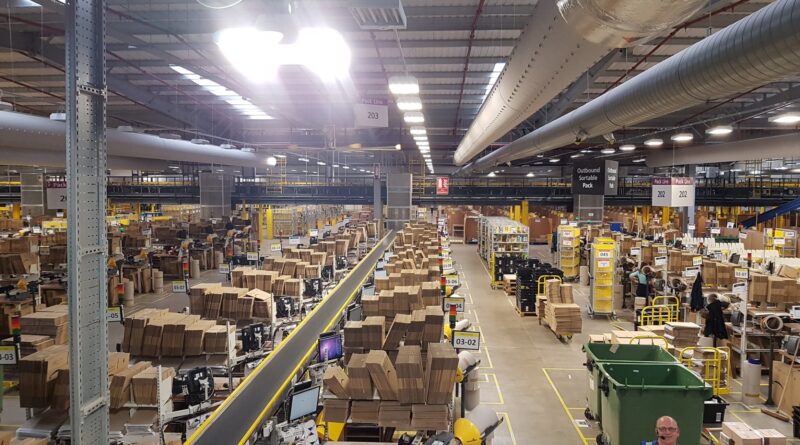Amazon factory worker reveals exploitative practices, and how they’re fighting back
DiEM25’s Frontline interviewed Agnieszka Mróz, an Amazon factory worker in Poland, who provided an insight into the company’s exploitative practices and the tactics that her union uses to push back
Few know more about the dirty tricks Amazon deploys to resist any meaningful change to the systematic exploitation of its workers than Agnieszka Mróz.
Not only has she been working at an Amazon factory since 2014 in Poznan, Poland, but Agnieszka is also a union organiser, and a key player in the struggle against the e-commerce giant for fair wages and better all-round conditions.
In the latest episode of DiEM25’s Frontline, Mehran Khalili sat down with Agnieszka, where she provides an insight into the various problems and possible solutions, from the company’s exploitative practices to the tactics that her union uses to pressure Amazon’s management.
Agniezska began by explaining the origins of Amazon unions in Poland.
We started in 2014 with 30 workers, some of them actually worked in Amazon warehouses in France and Germany, and were trained there.
When they came back, they quickly realized the working conditions are worse in Poland, and because they saw unions in action in France and Germany, they understood that this is our weapon as workers. So they decided that we should start organizing together in Poland.
What is it that’s worse about the working conditions exactly in Poland compared to the other countries where Amazon is present?
If you go inside the warehouse, most of the warehouses in Europe look exactly the same. So what is worse? It’s not really the type of work we are doing because we are doing exactly the same work as in other countries, but it’s about the legal framework, which makes our ability to organise different.
First of all we have much lower wages than Western European wages, of course. Secondly, we work 24 hours, seven days a week. And we are not paid overtime for working Sunday and Saturday.
We work ten hour shifts, including at night – that’s the difference. And then a very important difference, which is making our ability to organise more difficult, are the very restricted strike laws in Poland.
Because in order to organise a legal strike in Poland, the law says that you need a vote, like a ballot, of 50% of workers who are going to vote on the strike but it’s counted in the legal entity of Amazon Fulfilment Poland, which is 30,000 workers. So in order to organise a legal strike, we would need 15,000 votes. That’s a bit unrealistic, but that’s the law we have in Poland.

When you started working at Amazon, what were the existing unions, retail unions, etc, that you could join and why the decision to make your own union rather than connect your struggle to that of workers from other retail companies?
Amazon is anti-union in general, so they don’t want to play this social dialogue. They haven’t played that model of social dialogue unionism even with the big unions because they just didn’t want to have unions in the shop floor.
They call us third parties, but we are not third parties. We are workers in this shop floor, so they cannot tell us that we have our own interest or that we don’t work in the interest of workers. This is the strategy Amazon was really exploring against big business unions in Western Europe, but also in the US.
Tell me about some of the tactics that you’ve used in your struggle against Amazon. What works, what didn’t work, why didn’t it work, etc.
As I mentioned before, the strike law in Poland is very restrictive but it doesn’t mean we don’t want to use law as a tool. Right now, we are in the process of collecting votes on the strike referenda, but we use it more strategically. We would have to collect 15,000 votes to have a right to strike in Poland. But what the law allows us right now is to travel around all 11 warehouses in Poland and be present in the canteens, in the in front of the warehouse, talk to workers… So we also use it as a strategy of permanent rally, permanent pickets, that we are there in the canteen, we talk to the workers during breaks and before and after work.
We have access to the warehouse. This is very important. And we hope we can get as many votes as possible, but what has value itself is just having access to our colleagues, which Amazon usually is very strict that about, that one warehouse [can liaise with] another warehouse. Usually there is no access.
Is this strike that you are now collecting votes for, is this part of the international action for Make Amazon Pay for Black Friday on the 25th of November?
The one demand we have right now is just about higher wages, so we demand six Polish zloty more (1.28 euro), and of course it is a part of the ‘Make Amazon Pay’ campaign, because we want Amazon to pay us higher wages.
But of course, it also refers to the wage difference between Western Europe and Eastern Europe. So we believe we deserve more. We also believe that the wages Amazon offered this year – from 3% to 7% in different countries in Europe – are totally not corresponding with the growing inflation and our needs as workers to provide for our families.
So we believe that wages should be higher, and this is the first precondition. And in this way, yes, we want to make Amazon pay.
Within the last eight years, we experimented with different forms of organising and struggling. The most powerful actions were taken by workers on the shop floor level which were in direct response to some restrictions or some new measures introduced by Amazon.
To give one example, Amazon once came to the workers in the ship department – these are the guys who load trucks on the gates – and they [Amazon] said that if you violate some regulations you will be punished and you will not be allowed to drive a forklift anymore. But they were not objective at all. So it was actually a manager who could decide who could be punished or not.
So what workers did, they collectively refused, and gave back the driving license for forklifts. Workers said: ‘Okay, I’m not going to drive a forklift if you’re going to punish me on this non-objective condition’. The answer of the company was immediate. A top [level] manager came in, they started to negotiate, and they [the workers] won.
Another example are the pickers – a picker in the old school warehouses when there are no robotics, actually walk around all the little corridors where items are stocked on the shelves. And then, using a scanner, they find the item, put it on the trolley and send items to the packing department. They are those who collect items from the shelves. And usually they collect 12 to 15 items to a box and send the box to the packing department.
When the pickers were forced to do obligatory overtime, which meant a 12-hour night shift, they said: ‘This is too much, we do not agree with it’.
And they started to send one or two or three items to each box and send it to the packing department. And if you do it collectively, it’s just paralysing – the conveyor belt just doesn’t provide packers with enough items. These are some of the most powerful actions that have come from understanding that working collectively can directly affect the production inside the warehouse.
Other forms of action was a blockade during Black Friday in 2020, when supporters just blocked the gate for trucks coming in and out of the warehouse for at least three hours.
It was coordinated through leafleting inside the warehouse, inside the canteen, talking about our demands and talking about how to make Amazon pay in general.
And then we do a lot of leafleting action, we have a worker’s newspaper, we circulate leaflets regularly, we organise the smaller picket lines quite regularly, just to inform workers about their rights.
There was also an action called ‘Safe Package’, which was about providing certain tips to workers in different departments on how they can work slowly according to the health and safety rules, and that leaflet was part of the Amazon Workers International campaign, and was translated into German, French and Polish and distributed on Black Friday at the same time in different countries.
What do you mean exactly by working slowly? Do you mean to not overexert yourself and create people who are exhausted on the job?
Amazon is putting a lot of pressure on workers to reach a particular target of items per hour. So they would say you have to make 200 or 300 boxes per hour depending on the department you work.
We have a lot of targets. You have to really know if it’s small items, big items, how many per hour you have to make, but you have to do [as many as they say]. And if you don’t, the manager will come and give you a negative feedback for productivity. So this is the reality we are facing on a daily basis.
But on the other hand, they have a lot of rules that contradict this pressure on targets because they would, for example, tell you that you have to look at every item from all six sides to make sure that the customer is not getting an item that is destroyed in any way. Or they would say that you have to follow the various health and safety rules, especially during COVID.
That was very visible because they expected us to keep two metres distance from each other while still putting pressure on our productivity. But we wanted to use this, during our struggles, as a way of saying that, if they tell us to drink water to not be dehydrated, it means that we have the right to, or we have the right to go to the toilet without being harassed by managers.
So if you organise these kinds of actions collectively rather than individually, it does affect companies and this is the kind of resistance that sends the message that we should be treated better.

What you’ve just described sounds like modern slavery – monitoring how often you go to the bathroom yet telling you that you’ve got to check each item thoroughly while still having to meet targets otherwise you get penalised.
Tell me how that feels for you, the situation that you’re in.
Actually organising with our colleagues helps us to survive the reality of our work. Because the company wants you to work on your individual productivity, to not talk to other workers, to just focus on work and work only. We don’t want to be treated like this because we are human beings.
We have the right to, for example, talk to our colleagues at work: we are not robots – this is of course the age old slogan of the labour movement at Amazon.
We are not robots, but we are also not slaves. Workers don’t like to be called this. There’s a patronising approach in the mainstream media, when they present say that it’s ‘digital slavery’, ‘it’s like algorithmic hell’.. you know, all these descriptions that are quite ‘sexy’ for the media, but they don’t appeal to workers because us workers have our dignity and we don’t want to be called slaves.
Because if you call yourself a slave, it actually cuts you from the perspective that you can organise and fight for improvements.
So we would rather focus on making connections. Organising within the warehouse is all about making connections with others, to break this isolation and just to think together about what we can do about it. And actually that makes our ten hour shift survivable. Because if you don’t want to be another algorithm or appendix to the algorithm, and if you’re a human being, then you have to find your community, your group, that when then manager is coming to you for ‘one-on-one’ talks – they love these one-on-one talks – and we say, no, we are not one-on-one.
We have our friend who is a picker working next to us, or we have a shop steward from the union who can come. You can just share your story that you’re not alone.
So one-on-one talks are great for isolating the problem, rather than letting other people in on what’s wrong.
Yes, exactly. That’s why Amazon is so openly anti-union because they know that in the union, we are not one against them, that we are holding this collective force.
And of course they do respond. They do oppress us. We had to of our shop steward stewards from our union fired last year. They put us in different departments, they make our lives harder and harder. We got a lot of disciplinary letters as well, so they let us know they are watching us. But that also means that they are afraid of what we are doing and that we are kind of doing our job well.
You’ve spoken in terms of ‘us and them’, the management and the workers. I presume you’ve got good, respectful relationships with some people in the management in that there is a bit of give and take or is it just antagonistic?
What’s the psychology of it in a typical working day for you?
I would say it’s very antagonistic to the extent that a lot of my colleagues, when you go by bus and you see the warehouse approaching, a lot of my colleagues would say, ‘oh my God, I have a stomach pain, I don’t want to go there’. Like ‘I’m here again’.
People just feel this pressure on their bodies from the very beginning. Most of the workers would not work longer than three or four years because your body is so overused that you look for any kind of alternative. If you find an alternative, you just go.
I want to add that the structure at Amazon is very flat. Most [of the workforce] is warehouse workers, while leaders and managers are few. So you don’t have this strong hierarchy between regular workers. We are all making the same wage. We are all working the same hours so, in the warehouse, when there is 5,000 workers, 80-90 percent would be on the same contract, so the structure is very flat.
But also, if you are working inside, it is, as we call it, exploitation with a smile. Because the managers would not shout at you. They would come to you and with a smile, they will ask: ‘how can I help you? You are slowing down today.’
So they are not antagonistic to your face but you know that, through all the tools they use to measure our work, through scanners and computers, it just means total control of our speed. And if you slow down, they would, with a smile, come to you and say: ‘here is disciplinary letter because we noticed that you didn’t work for eight minutes here, seven minutes there, five minutes here…’
And then they take away a day off, accusing you that you took an additional 40 minutes of break, because they add it all up. So you can talk nicely to your manager, but you know that this manager will come to you and give you this disciplinary letter because the system prints them out and this is his job, to discipline you when you slow down.
So as I said, wage is a problem. Low wages that are totally incompatible with the huge profits we’re making. But also the second demand is about not treating us like robots, controlling us through robots, because we don’t want to be controlled by these algorithms.

Some people might read this and think that it’s wonderful that Agnieszka is pushing for better conditions for her and her colleagues but, if it’s so terrible, she’s been there since 2014, why does she stay? Surely there are other things that she can do. Perhaps you can shed a little light on your own personal situation that makes this your choice of work.
Talking amongst colleagues, a lot of us have worked in smaller warehouses or factories, and the conditions were even worse.
They say we have to stay here, not quit and look for alternatives. We have a saying in Polish: You can, from a little rain, end up under the drainpipe (English equivalent: Out of the frying pan and into the fire). The idea is that it’s better to stay here in the hope that, because Amazon is so big and so influential, the important struggle for the improvement of the conditions of all workers can be achieved across the board.
There are a few more companies that actually try to set up conditions in the whole sector. So if we are there and we want to learn how they discipline workers, what kind of kind of tools they use, how to implement these improvements… we should also understand what is happening in the whole sector.
So it’s not some kind of liberal approach of ‘If you don’t like it, find a better place’. Some of my colleagues worked in 15 workplaces like this. There are millions of us in Poland working in these kinds of conditions.
I believe that a challenge for labour movements and for us as labour activists is not to look for individual solutions, individual careers, but to go back to these places, even find a job if you can for a short time. It’s good to read about how capitalism is working, it’s really good to know the theory, but it’s really a life-changing experience if you go into factories, if you go to work in these warehouses and try for yourself to break this isolation, alienation..
You can read about this in very important books, but you really have to experience this and take this challenge of changing the world, to fight capitalist exploitation for real.
And Amazon being such a big company and such a prominent company, that’s where the fight really is. And you get first-hand knowledge of all these mechanisms of exploitation or control, the digital surveillance and so on. You start to understand how they control the workers because probably other places are much further behind in terms of how they manage these mechanisms…
And from that experience, you can actually join the movement because the movement is growing. You can really see it from a wider perspective. Amazon has been operating since the nineties – in Europe, its first warehouse was created in 1998. It really took really time for us, the labour movement, to start doing things.
But there are so many exciting new initiatives that have been happening in the last years. Look at the situation in us, but not only, you know, there’s, Grassroots movements are in every country. In Europe, wherever Amazon is, you can find people trying different strategies [to fight against it].
There are some bigger unions, smaller unions, or more social movement people who try to build coalitions between labour movements and environmental movements and all this. So there are many points where you can become a member of this movement. Of course we, as workers, say that the most powerful position is to be on the inside, talking to other workers and to build this movement from the inside.
But I would say, for those who are starting in the labour movement, I think it’s really an exciting challenge. Because you can easily connect. Right now, through these [social] networks, we are connected. You can find our unions and different unions on social media. You can read about it. The media is willing to ask us for interviews because Amazon is a big player. So there is a space in which we can talk about our struggles, and I think this movement can make a difference. It’s growing, and campaigns like Make Amazon Pay show that we have a leg to stand on.
How many people are working in the warehouse in Poland?
It’s changing, depending on the peak time. Altogether [there are] 30,000 workers in Poland in 11 warehouses.
In my union, there are 1,000 members right now, but because of the high turnover, people come and go, so actually we have had three times more who have gone through this experience of doing things together.
So we don’t see this is as a defeat that these 4,000 who went through our ranks are gone We say in touch – some are now truck drivers, work in delivery sectors or work in other factories. They call us for advice and, in this is the way we are networking with other people from other workplaces.
November 25 is ‘Make Amazon Pay’ day, the worldwide campaign organized by our sister organisation, the Progressive International for Black Friday, in which they call for a strike on that day.
There have been previous such initiatives in the past which also related to consumer boycotts and strikes. Does asking people not to buy anything from Amazon on a certain day make an impact?
I personally believe that it’s much better to support organised labour movements than to go on an individualistic consumer boycott. But as long as this form of networking and campaigning is going along with what we do in the warehouses, that also helps us because that brings attention, that give us space to talk about our problems as workers.
So I see that the Make Amazon Pay campaign is just this space, not just one campaign. A space where people coming from different traditions, from different unions, can use one slogan that we all agree on, that Amazon should pay,for higher wages, for climate destruction, for taxes and so on.
So what in your view is the best way to communicate the struggle of Amazon workers worldwide in a way that isn’t dehumanizing, victimizing and demoralizing for workers?
The best way is to talk about struggles and campaigns that are happening. They are exciting cases and campaigns every year so it’s all about doing some research, to collect these experiences and show that workers are able to make demands and take action.
As long as you focus on our struggle, if you say that the demands of these workers in different countries are important. That’s why as outside activists, you create spaces in which these demands can be heard. And this is for me make what the Make Amazon Pay campaign is about.
Also try to not stay on this symbolic level. If you can, go in front of an Amazon warehouse on that day, because you might be surprised. On that day, workers could distribute leaflets, hang banners, maybe workers there need support, financial support through the strike fund. Maybe they need people to come at four o’clock in the morning before the morning shift to just help distribute leaflets, come to the picket lines, try to be involved.
And if you can, just go and start working on Amazon – it’s not difficult and you can have this experience yourself. You can connect with us, with local unions, and make this movement grow.
Find out more about Amazon Workers International here and the Make Amazon Pay campaign here
You can watch the full interview below




